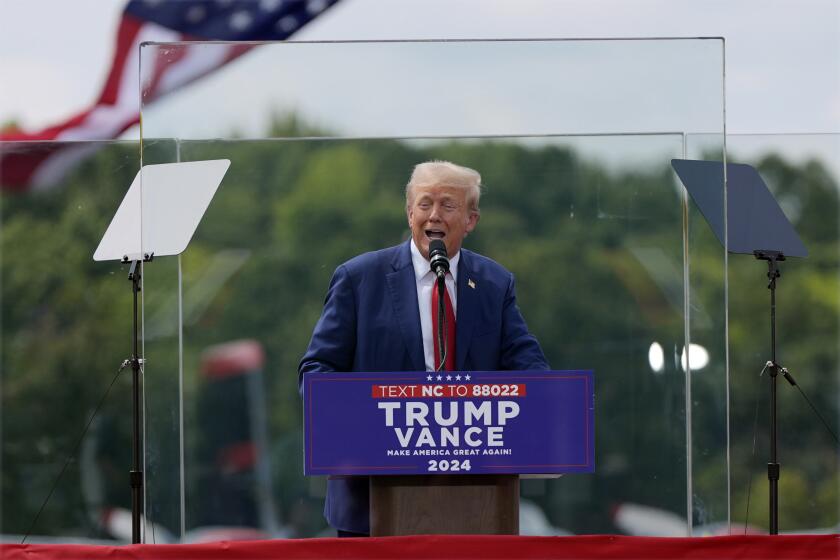Powell Begins Asia Trip Amid Crises in Region
Secretary of State Colin L. Powell arrived here Monday on his first swing through Asia amid two breaking regional crises--the ouster of Indonesia’s president and the plummeting of Tokyo’s stock market--that underscore the challenges the Bush administration faces across the Pacific.
The United States quickly embraced the hasty elevation of Vice President Megawati Sukarnoputri to head Indonesia, despite the refusal of her predecessor, Abdurrahman Wahid, to step aside. But U.S. officials are seriously concerned about the prospect of unrest in the world’s fourth-most-populous nation.
At a news conference here today, Powell congratulated the Indonesian people for the peaceful transfer of power but called on all parties to act responsibly to prevent further instability in the newly democratic country.
Regional stability will be a prime topic at the annual Assn. of Southeast Asian Nations, or ASEAN, conference this week in Vietnam, which brought Powell to Asia.
He arrived in a region already nervous about a severe economic slump, which is almost certain to worsen after the Tokyo stock market dropped to a 16-year low Monday over concern about corporate earnings and local bank attempts to write off bad loans. The dramatic drop also might complicate or delay government reform efforts.
Japanese Prime Minister Junichiro Koizumi, who came to power in April, pledged that his government will continue with its reform agenda regardless of a gyrating market. En route to Tokyo on Monday, Powell told reporters that he will “encourage aggressive action” to expedite Japan’s reforms.
After meeting with Koizumi today, Powell added that if the government’s plans for reform prove successful, “other things will follow in due course,” referring to the stock market and other economic indicators.
Powell’s weeklong tour will also take him to China, South Korea and Australia. His trip to Beijing will be the first visit by a senior U.S. official since the April crisis over an American spy plane that was forced to land on China’s Hainan island after colliding with a Chinese fighter jet. The secretary is expected to take steps toward improving U.S.-China relations in advance of President Bush’s scheduled visit in October.
The controversial U.S. plan to develop and deploy a new missile defense system, which would mean overhauling the structure of arms control dating back half a century, will be a prominent issue at every stop. Powell is expected to play salesman throughout the region in the face of significant global skepticism.
Missile defense arguably has more support in Japan, given its proximity to North Korea, than it does among Europeans. “During the G-8 summit [of major industrial powers in Genoa, Italy], the Europeans were not so receptive on the U.S. missile defense plans,” said Takashi Kiuchi, research director with Shinsei Bank. “But the missile threat is probably a bit more acute in Asia.”
Japan has agreed to take part in the research stage but has not signed on to the program as a whole. Any move forward will almost certainly raise tricky legal and political issues related to Japan’s pacifist constitution.
At a press briefing before leaving Washington, Powell said he was pleased that the Japanese government has an open mind on missile defense.
But the reception in China and among some ASEAN countries is not expected to be as warm. Several nations fear that the planned U.S. strategy to deal with weapons of mass destruction will only trigger a new race in offensive arms, notably in China, rather than simply provide an innovative approach to defending America and its allies.
Powell faced two other particularly sensitive issues in Japan, his first stop. The most contentious topic between the two long-standing allies is the Kyoto Protocol on global warming, which Bush has rejected. At the Group of 8 talks over the weekend, Koizumi said he was still trying to persuade the United States to sign on.
The U.S. military in Japan is a second thorny issue. The alleged rape of a Japanese woman by a 24-year-old U.S. airman in Okinawa late last month angered Japanese and spurred new demands here to reduce the number of U.S. troops stationed in Japan.
Powell said today that Washington is now exploring ways to reduce the “footprint” of U.S. forces, referring to the impact of the American presence in Okinawa.
More to Read
Sign up for Essential California
The most important California stories and recommendations in your inbox every morning.
You may occasionally receive promotional content from the Los Angeles Times.










